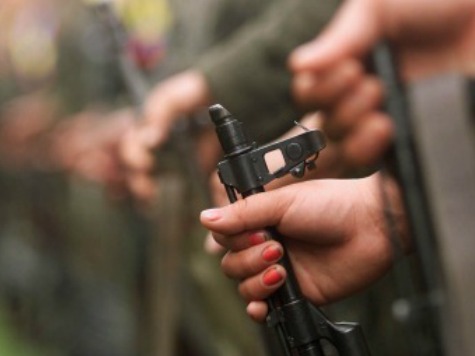
The Revolutionary Armed Forces of Colombia, a Marxist terror group based in that nation and partially bankrolled by the government of Cuba, is richer than Al Qaeda, the Taliban, and Boko Haram combined, according to a Forbes ranking of the world’s richest terrorist organizations.
As Breitbart News reported yesterday, the leaders on the list of richest terror groups released this week are no surprise. The Islamic State, which makes an estimated $2 billion a year, tops the list, followed by Hamas, who make half of that. The third richest terrorist group on the globe is no jihadist group, however, with no oil revenue (as ISIS so heartily enjoys), or as much international support from Arab nations as Hamas.
It is the FARC, a group the international left have strived to argue is neither violent nor relevant in the 21st century. The group earns an estimated $600 million a year.
Forbes estimates that the Taliban, the fifth richest group, makes $400 million a year; Al Qaeda misses the top five with $150 million. Boko Haram, one of the poorer yet nonetheless dangerous jihadist groups, rounds out the list at number ten with $25 million a year in revenue. The three groups make less combined in a year than the FARC.
The FARC is the most resilient Marxist/Maoist guerrilla group in Latin America, one of the few survivors in a crop of terrorist syndicates that include the now-defunct Shining Path (Sendero Luminoso) in Peru and the barely-relevant National Liberation Army (Ejército Nacional de Liberación–ELN) in Colombia as well. It has survived due to a number of international factors, apathy among the most pivotal. While the world took up arms against radical Islamists and called for peace between Russia and the post-Soviet states, the FARC carved out a stronghold in Colombia, under the guise of being Che Guevara-esque “liberators” of peasants.
While true in much of the 80s and 90s, the attitude that the FARC were a minor international problem changed dramatically under the leadership of President George W. Bush. Thanks to subsequently released reports, we now know that the Bush administration worked closely with then-President Álvaro Uribe to recreate the counter-terrorism strategies used against Al Qaeda in Colombia. They worked, as leader after leader of the FARC was killed through strategic targeting. By the end of the Bush years, much of the remaining FARC leadership had fled to Cuba.
The end of the Bush/Uribe era has meant the beginning of a series of talks– all mostly ignored by guerrilla members on the ground– defined as a “peace process” meant to reintegrate FARC soldiers into civilian life. The Colombian government under current President Juan Manuel Santos has gone so far as to establish a sort of “re-education camp” for captured FARC terrorists (many forced to join the group as children) in order to teach them how to become productive members of society. The talks have so far been held in Havana, new capital of Latin American terrorism, and the FARC have made several demands– including both becoming a part of Colombia’s political infrastructure and some immunity for its leaders. A year ago, the Santos government agreed to give the FARC political leverage in the democratic process; this did not stop the FARC from committing acts of terror, like they had promised to do.
In return, the Colombian government has attempted to offer a series of “ceasefires” in which the FARC would refrain from committing terrorist acts. All have been broken.
In the meantime, the FARC have worked to soften their image, releasing music videos with prominent communist Cuban rappers and Christmas greetings. The combination of propaganda efforts to appear interested in peace and the undeniable allure to the rest of the world of following the ensuing ISIS saga in the Middle East has proven beneficial to the FARC as they continue to engage in violent drug trade to fund their terrorism.
In the meantime, outlets like Al Jazeera have lionized the FARC as problem-solvers, suggesting that they have “solutions” to the illegal drug trade that the United States is likely to ignore because of the “war on drugs.” The reality is that almost the entirety of Colombia’s illegal drug trade is either run by or somehow influenced by the FARC, and that the United States efforts against the FARC are counter-terrorism. The Bush-Uribe project as a CIA, not a DEA, production.
The FARC are putting their friendly masks on this week yet again. After an indigenous tribunal– the very people the FARC claims to represent– sentenced two FARC leaders to 40 and 60 years in prison for various acts of terror, the group’s leadership issued a statement claiming it was sorry: the group “profoundly laments” the incident.
FARC guerrillas’ actions belie their attempts at making peace-loving statements in the past few years. Anyone paying attempting can easily identify their claims to peace as a sham. But few are paying attention, and now the FARC have risen to ISIS and Hamas levels of monetary backing. Unlikely ISIS and Hamas, however, their leadership is entirely based in our hemisphere, working to re-legitimize themselves 90 miles from American shores.

COMMENTS
Please let us know if you're having issues with commenting.